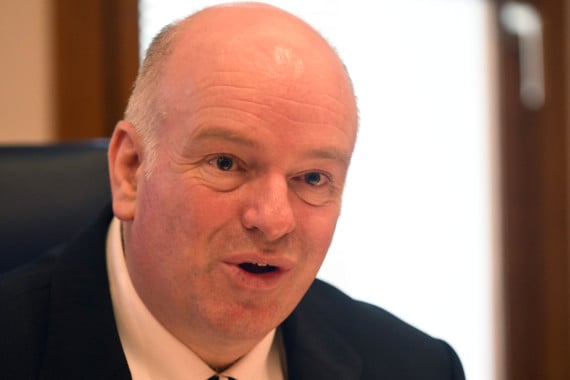*Word of the year: Sensationalism
Howard Quayle took the somewhat bizarre decision to use his state of the nation address - a rather grand title for what became an orgy of self-congratulation among Tynwald members - to criticise the Manx media and hit out at ’sensationalism’ in the island’s journalism.
A couple of weeks later - following a slight detour involving a most peculiar press conference called before he appeared to know what he would, or could, tell the assembled journalists - Mr Quayle discovered the true meaning of sensationalism when the Paradise Papers were published.
Hopefully, he realised sensationalism did not mean humble reporters straying slightly from the scripts that he follows so closely, more like taking something and blowing it out of all sorts of proportion, accentuating it with innuendo and misdirection.
This was shown in the hatchet job by the BBC’s Panorama, which played fast and loose with accuracy and conveniently ignored much that did not suit its own agenda, or The Guardian, which in a claim that put Mr Quayle’s previously bizarre behaviour in the shade, erroneously suggested the Isle of Man media was not giving the papers much coverage.
That was sensationalism.
For the record, the Isle of Man media reported extensively on the Paradise Papers. Just as it does with the news the rest of the year. Mr Quayle seemed genuinely offended that, sometimes, people might hold an opinion different from his.
We wonder whether Mr Quayle has reassessed that opinion of the Manx media in the light of subsequent events, or developed a better understanding of the word sensationalism. But we are not going to hold our breath.
*John Virgo give him a break award: Jason Moorhouse.
A surprising choice, perhaps? He is often mocked and, I may be in a minority of one, but I’m starting to tire of it.
He may not be the most dynamic speaker, but he’s not alone in that.
Last year, he was singled out for being quiet. He wasn’t the only one.
Social media ended up criticising him in 2017 for reading from a script, when he was doing just that: reading from a script because he was standing in for a minister who was absent from a sitting.
He was lambasted when he got muddled up on the order of questions in the House of Keys. He wasn’t the only one who got confused - the order paper had been changed from its original version.
Sometimes, he needs to find better examples to illustrate his point. Seagulls are a pest - but the impact they can have on, for instance, a catering business, is more serious than a relative sacrificing a sandwich. (Although find me someone who hasn’t got a seagull story of woe to tell and I’ll show you someone who has not lived here long enough.)
His comments about trying to ’retain editorial rights’ on interviews about matters of ’national importance’, however, were worthy of criticism. At best, they were badly worded and, at worst, deeply concerning but, most likely, they belonged somewhere in the middle and came from someone still getting to grips with the joy of public debate and using a bygone era as his source.
He’s been there 15 months. Trust me, there are politicians who have been there 15 years capable of saying things much denser.
The thing is, other politicians have picked up on how he has been targeted - ’mainstream’ media has to hold up its hands as much as social media - and one or two ministers have used that to their advantage. ’We all know that Jason Moorhouse, right? He said that funny thing about seagulls. So, let’s just dismiss him and make ourselves look a bit clever in the process.’
Sometimes the easiest targets are not the most legitimate. To be honest, he’s got a better case for being a victim of sensationalism than Howard Quayle.
Politicians are there to be criticised, but let’s ensure it’s always with cause and it’s on what they say, not because they tripped over their words or they come across as a bit nervous. Otherwise, it sometimes starts to feel a little like bullying.
*Best double act: Chris Thomas and Lawrie Hooper
A close call this one, but Chris Thomas featured in both the leading pairings.
Firstly, there is the dynamic between the policy and reform minister and David Ashford - Cabinet Office colleagues and two of the more talkative members of the House of Keys.
Sometimes, you do feel like suggesting to young David that he could just stick his head round the door and check something out with Mr T, rather than table a question for parliament.
But, where would be the fun in that?
The Cabinet Office Couple, however, is put in the shade by Chris Thomas (again) and Lawrie Hooper, who are a joy to behold when in action across the floor of the Keys. So, they take the prize
They share a love of the process as much as the politics, and sometimes, there is a twinkle in both sets of eyes, when they share some statistics-related bantz across the floor.
When they go into the minutiae of an obscure piece of analysis, Speaker Juan Watterson must be tempted to intervene and order them to get a room, inside which they could conduct reviews to their hearts’ content.
It’s a bromance up there with Joey and Chandler, from Friends, or, perhaps, Bert and Ernie from Sesame Street.
*The Marks and Spencer award for being fully briefed: All of them.
This goes to the whole of Tynwald.
One of the reasons for the jolly sense of consensus in the current administration, we suspect, is the number of times the real argument is held before it reaches the floor of parliament.
A quiet word with some of the more experienced members of the chamber confirmed that the number of government briefings held about a variety of issues looming on agendas has increased considerably.
Hence, sometimes, there is a surprising level of agreement when it comes to the public debate.
The standard riposte to any such criticism has been that it is a vast improvement on the previous Tynwald, which was constantly stymied by petty arguments and personality clashes.
There’s a balance between the two extremes, but the current administration is nowhere near close to it.
When it comes to talking about themselves and Tynwald itself, most are more than happy to hold that debate in public. But on certain other issues - the Steam Packet springs to mind - we’d like to hear a little more discussion on the floor of Tynwald, rather than discover that minds were made up in a prior briefing.
More than one Tynwald member argued it was better for the government not to show its hand to the Steam Packet, and that’s why the Tynwald debate in July was surprisingly short.
Well, perhaps someone should have thought about the concealment of any hands before producing and publishing a document, which outlined all the options on the table?
Not that we should let that worry us when we consider the thought of the government buying the Steam Packet, especially during this time when the public is being asked to swallow cuts and ’efficiencies’ that are hitting them in the pocket.
*Political moment of the year: Handmaids at Tynwald Day
Without a doubt, the protest by the pro-choice Handmaids Isle of Man on Tynwald Day was the stand-out moment.
Putting aside opinions from either side of the abortion reform debate, the resonance was unmistakable.
Such eloquence and impact, without uttering a word, is something most professional politicians can only dream of.
*Honourable mention: Rob Callister.
Quitting a department on a matter of principle - especially so early in one’s career, as Mr Callister did - is quite dramatic.
He left the Department of Health and Social Care, reportedly, after Minister Kate Beecroft asked her political members to sign a letter amounting to a no confidence vote in the chief executive.
However, what made it all the more significant was the reaction of the government, which seemed to spend more time trying to discover how the media found out, rather than investigate the underlying cause of the actual issue.
It proved to be an early indicator of an administration with a tendency to shoot the messenger rather than target the problem.

.jpeg?width=209&height=140&crop=209:145,smart&quality=75)
.jpeg?width=209&height=140&crop=209:145,smart&quality=75)
.jpeg?width=209&height=140&crop=209:145,smart&quality=75)

Comments
This article has no comments yet. Be the first to leave a comment.